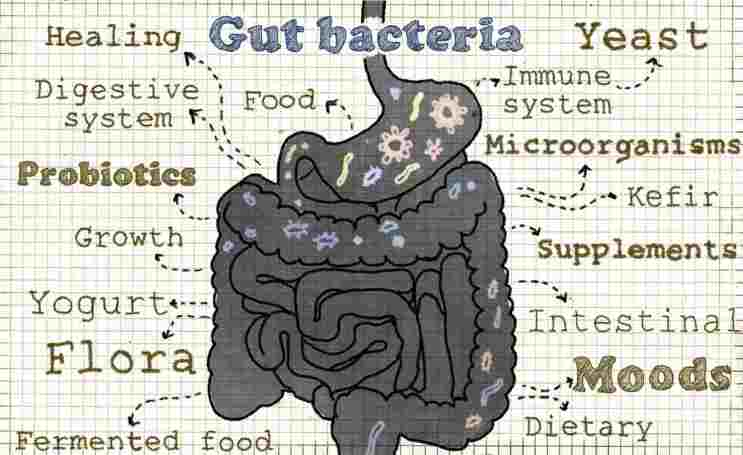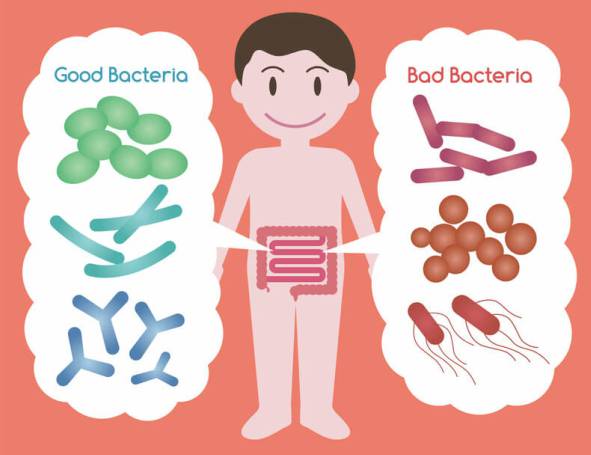Last updated on June 8th, 2018 at 07:53 am
Human gut harbors enormous amount of microorganisms which helps in maintaining optimum condition inside the gut. Nature has created the human system with an enormous precision that even the microorganisms that were thought to be useless play amazing and subtle roles for the proper functioning of the body. These little creatures don’t lead to any pathogenic problems in a normal individual, instead are important for the proper digestion and absorption of nutrients. Between one to two years of age, microorganisms get fully established in the human gut. Intestinal microflora and intestinal epithelium show commensalism where intestinal epithelium aids the growth of microflora and inhibit the invasion of pathogenic organisms. Since the proximal part of our gut is acidic in PH, so only acid resistant organisms can survive in our gut. Organisms that are predominantly found in the human gut are Streptococcus, Staphylococcus, Lactobacillus, Peptostreptococcus, and types of yeast.
Roles of Intestinal Microflora
- Acting as a shield against pathogenic organisms
The communities of these microflora act as the soldiers defending their territory from pathogens by harboring the available spaces in the gut, utilizing all the available nutrients for their own growth and secrete compounds that are lethal to foreign microorganisms. An example would be Lactobacillus acidophilus, a gut flora that inhibits the growth of Candida albicans, a type of yeast that can cause infection.
- Maintains the immune response in the intestinal Epithelium
Gut flora induces the immune system to produce cytokines that drive immune system to elicit an inflammatory response and also tamp it down for the maintenance of homeostasis. This process also helps in healing of intestinal epithelium after injury. Gut flora also regulates the conversion of B-cells into IgA, an antibody that maintains the healthy state between the host and gut flora by eradicating the bacteria responsible for the inflammatory response and help diversify the gut flora.
- Metabolic functions
Gut flora is capable of secreting some enzymes that help in digestion of some polysaccharides that the human gut cannot digest on its own. In an experiment, it was observed that rodents lacking in gut flora and raised in a sterile environment required 30% more calories just to remain the same weight as their normal rodents in the regular environment. Starches, Oligosaccharides, fibers etc are some carbohydrates that human gut cannot digest and absorb without gut flora. They also play important role in protein digestion.
- Absorptive and secretary function
Vitamins like biotin and foliate are synthesized by gut flora whereas minerals like calcium, magnesium, and iron are absorbed with the help of these creatures.
What are the consequences of depletion of gut microflora?
- Excessive use of board spectrum antibiotics
Excessive use of broad-spectrum antibiotics alters the number of gut flora which may impair the host’s health and ability to digest food. If the number and species of gut flora are altered, it can reduce the ability of the body to ferment carbohydrate and metabolize bile acids and may lead to diarrhoea known as antibiotic-associated diarrhoea. Carbohydrates that are not fermented may absorb too much water and cause watery stools, or lack of short-chain fatty acids that gut flora produces and lead to diarrhoea.

Depletion in the native gut flora can lead to the uncontrolled growth of harmful species such as difficile and Salmonella and induce diarrhoea as these foreign organisms are diarrhoea causing.
- Pregnancy
During the pregnancy period, an alteration is observed in the number and species in women’s gut flora. The changes are similar to those seen in metabolic syndromes such as diabetes. The diversity of flora decreases with the progression of pregnancy from the first trimester to the third trimester whereas the number of certain bacterial species increase. Mother’s first-trimester microflora resembles the newborn’s gut flora.
Synbiotics, prebiotics, and probiotics
Probiotics are microorganisms that act as gut flora in function. Prebiotics are indigestible fibers that pass through the upper gut undigested as well as unabsorbed and provide health benefits in collaboration with gut flora. Prebiotics boosts the activity of friendly flora by acting as a substrate for them and stimulating their growth. Synbiotic are the dietary supplements or food ingredients containing both probiotics and prebiotics in a form of synergism. Treatment with some probiotic strains of bacteria has shown improvement in Irritable Bowel Syndrome and chronic Idiopathic constipation. Streptococcus Faecium, Lactobacillus Plantarum, Lactobacillus Rhamnosus etc are few organisms in probiotics that are believed to decrease in symptoms of Irritable Bowel Disease and chronic Idiopathic constipation.




